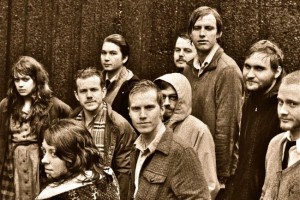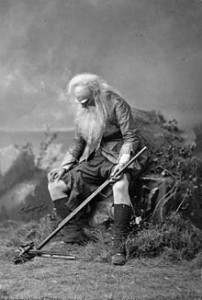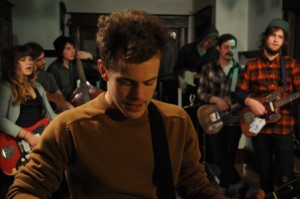 White Lighter
White Lighter
Roll Call Records
For most people the title of this album, White Lighter, would connote an inexpensive incendiary device of no pigmentary value. A white lighter is certainly something with which the average human might be familiar. You see lighters every day. Some of them may be white.
However, there are some walking among us (and I count myself as one) for whom the context is completely different. They are “white lighters.” They’ve seen the white light. Oh yeah, the vaunted white light at the end of the tunnel when you die. Sure. Most folks think that’s an urban myth, until they experience it for themselves. I began experiencing the white light at an early age and was availed of the occasion to experience it again a time or two through the course of my adult life. I think I know what Kyle Morton, leader of Typhoon, is talking about, and even though he refers to the BIC version a time or two, his thoughts seem not to be about firing up a joint or lighting a cigarette. He’s referring to what he calls “the pale light of certain death.”

It is fairly common knowledge that Morton was very sick throughout his childhood. Undiagnosed Lyme disease ravaged his body, resulting in organ failures and an eventual kidney transplant. He certainly courted death at a very young age. For some children, that sort of grave illness can produce a deep spirituality—a spirituality that arises from within and is not transmitted from the world outside. For many, the source of that spirituality is bathed in white light. It’s my guess that Kyle Morton is one of those white lighters.
Since their inception in Salem in 2005, Typhoon have moved in mysterious ways, in fits and starts. This is to be expected with a troupe that numbers in population somewhere near the dozen mark (plus or minus). It’s been over three years since the release of their well-received second full album, Hunger and Thirst and two years since their widely acclaimed EP A New Kind of House. Tremendous critical response to that recording led to an appearance on David Letterman’s show in August of 2011.

In some ways, Typhoon have something in common with the Decemberists, though musically they are very different. As performers Morton and Colin Meloy sound nothing alike. But what both bands do share is a propensity for drama. In the case of the Decemberists, that drama is a façade for the playwright in Meloy whereby he directs his various imaginary players as they strut and fret their moments on his musical stage.
Rarely breaking the fourth wall, Meloy is typically somewhat distanced from his subject matter, where Kyle Morton is inside of his. He has lived it. He is still living it. His drama is real. It comes from within. He and his orchestra create deep, dense, complex folk music that often perfectly articulates Morton’s thick, organic observations about relationships and life.
Their new album finds the band taking great strides in the creation of ornate musical tapestries, executing them with hard-earned facility and artistry. Beyond that they are clearly making an effort to carve for themselves a musical identity (as did Meloy and the Decemberists) that should stand them in good stead for many more albums to come.
 With abrupt and disconcerting pauses, stark stops and stutters, the band utilizes silence somewhat in the tradition of John Cage. You’ll hear their music on their terms, the way they want you to hear it—delivering the subtle message: “Don’t get too comfortable, things can easily go sideways.” It’s a good musical lesson. It’s an even better lesson about life.
With abrupt and disconcerting pauses, stark stops and stutters, the band utilizes silence somewhat in the tradition of John Cage. You’ll hear their music on their terms, the way they want you to hear it—delivering the subtle message: “Don’t get too comfortable, things can easily go sideways.” It’s a good musical lesson. It’s an even better lesson about life.
The opening track “Prelude,” a mere seventeen seconds in length, is unmistakable evidence that even the softest and most peaceful of moments can easily dissolve into static and distortion. Better fasten your seatbelts.
The concept of light, in all its various aspects and forms is addressed head on in “Artifical Light.” The orchestra—expansive, organic, pastoral—kalaidescopes majestically through Morton’s fanciful explorations of the subject. Plaintive strings, proclamatory horns, drums, bass, raindrop piano, delicate acoustic guitars, brusque electric guitars and chiming mandolin ring through an arrangement for which Sufjan Stevens would be very proud.

Like Stevens’ more symphonic endeavors, there is a certain looseness to the arrangements. It’s not the Oregon Symphony we’ve got here. Or even the Junior Symphony. Instead these aggregations sound most like highly urbane high school orchestras. That is in no way a slam. All involved are very sophisticated musicians, obviously dedicated, but at the same time, they are not necessarily first chair at their instruments (although they are improving fast). Besides, that ingenuousness is highly endearing.
So, over this rushing flood of delicate instrumentation, Morton contemplates manifold instances of light he has encountered through the course of his life. His voice, urgent, wincing, a broken glottal groan, initiates the ceremony: “In the beginning there was once a source of light/It would die and come back every night.” The song eddies and pools in places before coming to a dramatic conclusion: “Life goes on /Comes back on/We’ll all be here /In my familiar halls/ Empty jar/ Stolen song /Wait for the light /to come back home.” An auspicious beginning. A great start.
And if that first song were not epic enough in context, Morton goes one step further with the incredibly dense “Young Fathers.” How it is that Kyle so effortlessly logs long, winding narratives into four minutes of music, is a bit of a mystery. Nothing sounds crowded or compressed. The songs breathe naturally, without any sort of artificial respiration.
The introduction to the song is a tangled, mangled mess of sudden edits, head-on collisions—as if the recording software had gone awry, maybe it did. Or possibly, rather than to attempt to properly splice the parts together, they just leave it to the listener to put it together for himself. Whatever the case, the effect is quite jarring. But at the same time, the listener is forced to decide whether to actually listen to the song, or to simply conclude that he bought a defective recording.
 The actual song eventually locks in, and the brief upheaval is soon forgotten—though a skittering hesitance remains embroidered within the unfolding of this Neo-Wagnerian saga. Jagged electric guitar, ringing mandolin, effervescent strings, acquiescent brass, luxuriant nylon string acoustic guitar, ragged slamming drums and faint backing vocals find surprisingly clear space in the mix in support of the weighty ponder for which Kyle is now renowned.
The actual song eventually locks in, and the brief upheaval is soon forgotten—though a skittering hesitance remains embroidered within the unfolding of this Neo-Wagnerian saga. Jagged electric guitar, ringing mandolin, effervescent strings, acquiescent brass, luxuriant nylon string acoustic guitar, ragged slamming drums and faint backing vocals find surprisingly clear space in the mix in support of the weighty ponder for which Kyle is now renowned.
The lyric is nearly as lengthy as Ibsen’s Peer Gynt and almost as intense. In this instance the parable balances upon the fulcrum verse at its center. “Never went to church/thought a song was gonna save me/so I wrote a hymn on the guitar that you gave me/The signal once you spoke I built a fire with the spark/You know that hope is just a small thing.” It’s never altogether clear what Morton’s particular point is at any given time, as every verse is similarly open ended—in essence: lots of exposition and not a lot of summary. Just the same, there is a great deal of dizzy artistry in the steady beat of his conundrums. Mesmerizing.
The images of home, family, the flames of an exploding sun and general misfortune recur with “Morton’s Fork.” The cheerful, anthemic delivery of the chorus, betrays a far darker libretto: “And they’ll come through the fold/This is the sound of a wild pack of hungry wolves/I won’t lie to you /It’ll be painful/It’s in your nature to fear what is natural” And that’s the optimistic part! Even still, the uplifting choir of child-like voices hymn a winsome clarion.
 The fixation with stars and existence continues with “Possible Deaths.” Sweet instrumentation—warm electric piano, a plethora of light string sounds in exotic pizzacato and more fairy-like backing vocals augment the presentation. “The Lake” is a monumental construct worthy of Carson McCullers, all fireflies and youthful passion, though beneath that lies a much darker confrontation with sickness and death. “And then as my body turned against itself/I prayed for death that I might come back as anyone else.” A harrowing number that easily could have been pulled from Sufjan Stevens’ Illinoize album, somewhere between “Chicago” and “John Wayne Gacy Jr.”
The fixation with stars and existence continues with “Possible Deaths.” Sweet instrumentation—warm electric piano, a plethora of light string sounds in exotic pizzacato and more fairy-like backing vocals augment the presentation. “The Lake” is a monumental construct worthy of Carson McCullers, all fireflies and youthful passion, though beneath that lies a much darker confrontation with sickness and death. “And then as my body turned against itself/I prayed for death that I might come back as anyone else.” A harrowing number that easily could have been pulled from Sufjan Stevens’ Illinoize album, somewhere between “Chicago” and “John Wayne Gacy Jr.”
With “Dreams of Cannibalism” the morbidity evolves into Romantic pastiche, evoking My Morning Jacket most likely performing an obscure tribute to Charles Dickens in the process. Over a Morriconesque framework, Kyle emotes. “I fled the country/I thought I’d leave this behind/ But I built the same damn house/ on every acre I could find/ And I tried to fake my own death/ Just shake the devils from my mind/ I said/ Unhand me I am not a criminal/And if I am I paid the man just let me go/ Soon enough you will be dancing at my funeral.” It was the best of times, it was the worst of times…

Kyle Morton’s songs don’t really unfold the way most do. They amble. They meander. Often nearly formless they more resemble free verse poetry set to music, although there are occasional moments of traditional exposition. “100 Years” is an excellent example. Against instrumental calm and clamor, Kyle chronicles the tale of a futuristic Rip Van Winkle—a vision solemnly horrific as a morgue slab. “They laid me down and they stripped my clothes/They gave me a shirt that says/‘I survived my own life’/It was cold. It was cold. It was cold.” Later he serves as a Virgil to some other poor transmigrating soul. “We need heat where we’re gonna go/I have been there/I should know that/It was cold. It was cold. It was cold”

“Prosthetic Love” reanimates the quadruplely amputated corpse of the previous song, perhaps with a gift of appendages crafted from pure affection. The music a haunted trembling stumble, piano driven with loudly reported drum forays, tries to keep step with Kyle’s lurching vocal. “This time I wake I’m still alive/Now in my expiration date imagine my surprise/Some backwards take on the book of Job/His life was a wager and mine’s a joke.” Possibly the most straightforward number of the bunch.
Basically a long instrumental interlude in support of a brief lyric, “Hunger and Thirst” is not nearly as ponderous nor as finely focused as the other pieces. The music moves from the hum of a brassy beeswarm to moaning Indian flavored strings, then into a cheery brass passage that introduces a short soliloquy—which seems to have no real core. From there, the music flows toward an oriental theme voiced by child-like sopranos and brilliantly executed, delicate electric guitar filigrees. The strings sweep in to herald a darker region toward the close.
 The three compact verses (crafted with successive lines of four, five and six syllables) of “Caesar” contain a sequential consideration of the parameters of ambition and its ultimate uselessness. The final act of this passion play is enacted in the paean to the indomnitability of the human spirit, “Common Sentiments.” Over the smart, prancing gait of militant drums, in a pasture of bright guitar and verdant fiddle, Kyle sums a culmination of his difficult past to weigh against his pessimism going forward. “I’ve been trying to make myself better/So I can fare the fair foul weather/I write a song like a prison letter/I write a song maybe to make me feel better/It won’t break free my fetters.”
The three compact verses (crafted with successive lines of four, five and six syllables) of “Caesar” contain a sequential consideration of the parameters of ambition and its ultimate uselessness. The final act of this passion play is enacted in the paean to the indomnitability of the human spirit, “Common Sentiments.” Over the smart, prancing gait of militant drums, in a pasture of bright guitar and verdant fiddle, Kyle sums a culmination of his difficult past to weigh against his pessimism going forward. “I’ve been trying to make myself better/So I can fare the fair foul weather/I write a song like a prison letter/I write a song maybe to make me feel better/It won’t break free my fetters.”
“Post Script” is just that—an epilogue concerned with the idea of unconditional love. In that study he discovers that there are no conditions to his unconditional love (this is not meant as sarcasm). And he requires none in return. The final two minutes of the song allow the strings to play a romantic, classically modeled piece that resolves upon a desolate single note on the organ.
 Kyle Morton and Colin Meloy have a lot in common. Both are ironfisted captains of their ships. Whether Typhoon or the Decemberists, the two leaders present such strong personal visions in their work that the supporting cast is overshadowed entirely. It’s not that you don’t perceive the instrumentation here. It’s wonderful. Beautiful. Well-devised and expertly executed. But Morton’s persona is so powerful that he could draw the spotlight away from the Mormon Tabernacle Choir. His ruminations are so deep and heavy, that, like Hamlet, he is constantly weighing the gravity of his very being.
Kyle Morton and Colin Meloy have a lot in common. Both are ironfisted captains of their ships. Whether Typhoon or the Decemberists, the two leaders present such strong personal visions in their work that the supporting cast is overshadowed entirely. It’s not that you don’t perceive the instrumentation here. It’s wonderful. Beautiful. Well-devised and expertly executed. But Morton’s persona is so powerful that he could draw the spotlight away from the Mormon Tabernacle Choir. His ruminations are so deep and heavy, that, like Hamlet, he is constantly weighing the gravity of his very being.
Typhoon’s White Lighter is no romp through the forest with Maggie and Bill the transformed elk. This is hardcore life in the trenches—the stench of decay as thick as October fog. Not an opera, it’s a very precise song cycle, the order of the songs explicit. Where Colin Meloy is the cool, detached observer, Kyle is wrought with furious intensity, ripping out his soul. He sings as if every song may be his last. And, given his history, that possibility does exist.
But Kyle Morton is a smart guy, well acquainted with the other side. When his moment comes, he will know to join the other white lighters in the place of no dimension to reside where time is but the breath of wind.


